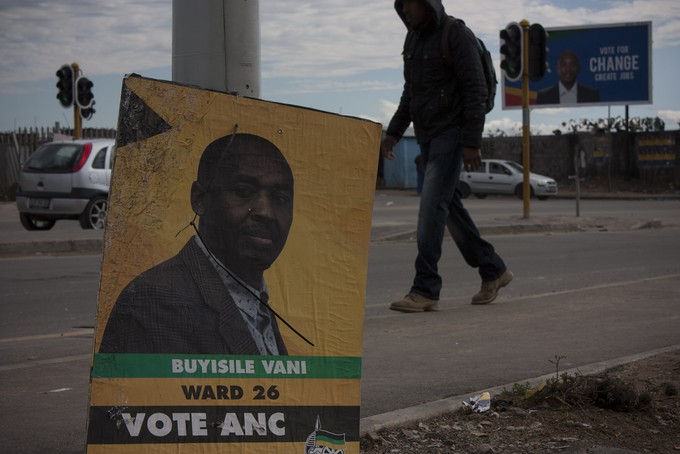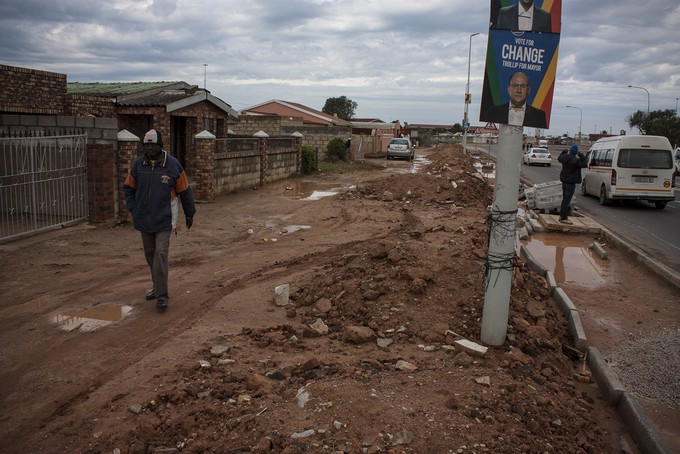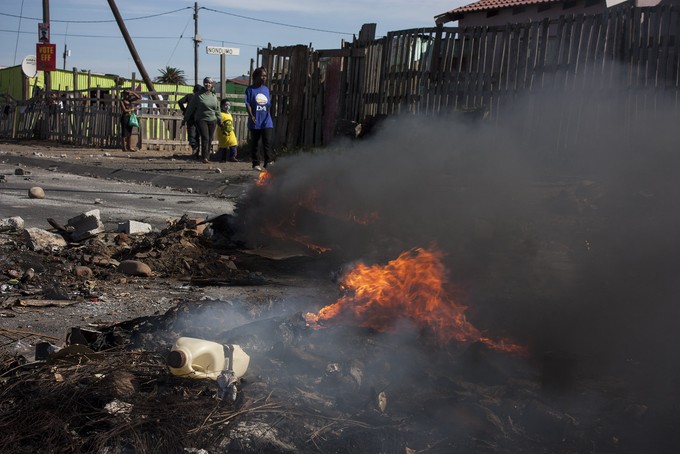Port Elizabeth’s ward 26: an ANC divided
While the ruling party is unlikely to lose this ward on Wednesday, it showcases its problems in the city
The telltale signs of protest: piles of half-burnt refuse, rocks and rubble and circles of blistered tar created by burning tyres mark the length of Qeqe Street, the longest street in Port Elizabeth’s ward 26, otherwise known as Zwide 3.
When Zwide residents are upset with the local authorities, it is on Qeqe Street that they make their grievances heard, and the thick acrid smoke of dissatisfaction has blown down that street on numerous occasions this year.
The most recent was on the morning of 19 July, the same day DA leader Musi Maimane and his provincial counterpart and Nelson Mandela Bay mayoral candidate Athol Trollip were to address residents in the open space of a children’s playground on Qeqe Street.
Tyres were still smouldering as Maimane and Trollip arrived shortly after noon, but the protest in this ANC stronghold that achieved 89% of the vote in 2011 was not against the arrival of the opposition party. Earlier this year the smoke indicated dissatisfaction with the commencement of a housing project in a neighbouring area before housing concerns in Zwide 3 had been been attended to. Now it was also because of anger from a faction of ANC members that the ruling party had decided Patrick Buyisile was to be their ward candidate in the municipal elections on Wednesday.
It is unlikely the DA arranged their address in Qeqe Street without knowledge of ANC voters’ dissatisfaction; people who live in the area and are active in civil society say it is no secret the entire area, known as the Champion Galela cluster – named after one of the Pepco 3 – is riven by internal ANC struggles.
The common theme is the way the ANC’s has managed ward candidate nominations. Residents are told from top regional structures who they have to accept and vote for, rather than there being consensus achieved from the ground up through votes cast at branch level.
The result in ward 26 is that they have a candidate on their posters whose registered address is outside the ward and was two years ago charged with domestic violence, although the case has since been withdrawn.
Inside the ward’s struggles
After having been given some background to the political dissatisfaction in Zwide by civil society representatives, GroundUp was directed to Vusi Mini, the provincial coordinator of the NGO umbrella body, Sangoco.
Mini spoke to us in the community centre he lobbied and found funding for after he became unemployed after a lifetime of being involved in the anti-apartheid struggle. He sketched a broad outline of the current split in the ANC between supporters of President Zuma cabal versus former Cosatu General Secretary Zwelinzima Vavi and Numsa General Secretary Irvin Jim, before linking it to the struggles at ward level.
The essential problem, Mini believes, is that the ANC has changed from a “bottom up approach to top-down”.
“In the ANC, people are supposed to elect you and give you a mandate. Now, people are elected and then leadership goes back to the people to say ‘here is the programme’.”
He said that at the branch Annual General Meeting in January at which membership was meant to be collected and all members checked to ensure they were “in good standing”, which was chaired by “a senior person from the regional structure”, a number of requirements were not met. Although some people voiced their concerns, the chairperson stated complaints should be taken to the regional ANC structure and the meeting was allowed to continue, with people being elected to branch leadership positions.
He said an official complaint against bias from the chairperson; that there were people in attendance who were not on the ANC member “master list”; and that the venue had no lights which resulted in the voting taking place candle light, was filed. Nonetheless, Mini said the Branch General Meeting (BGM) for the nomination of ward candidates went ahead, chaired by the same person against whom complaints had been made.
Within the BGM, a committee of six people were elected to screen four candidates for ward 26.
He said the four candidates were selected by a show of hands raised in a room so dark it was difficult to tell whether some people were raising both their hands. The most popular candidate, by 54 hands, was Buyisile, who Mini says many people have a problem with due to his not residing in the ward and having had a charge of violating a protection order once laid against him.
The current councillor, Siyabulela Hodi was second with 37 hands and the two others, both women, were chosen by the raising of 17 and four hands respectively. The vetting of the four potential candidates to see if they met the Independent Electoral Commission’s requirements took place and the most popular female candidate came out on top, said Mini, with Buyisile’s eligibility being questionable. However, Mini said the screening committee then met in East London and returned to announce Buyisile as the ward candidate.

What rubbed salt into the wound though, was not only that correspondence regarding the complaints the branch had submitted was circulated among those the complaints were levelled against, but that the final report dismissing the complaints was delivered to the ward’s ANC members by the very man at the heart of the complaints: Buyisile himself.
“The struggle starts from there,” said Mini.
He said half the ANC members in the ward are now “united to ensure Buyisile is voted in” while the other half “are dominated by those” who don’t.
There has been no decision taken as to whether to vote for an opposition party or simply to not vote.
“Each person will decide for themself,” said Mini.
Although GroundUp could not get hold of Buyisile, ANC regional task team convenor Vuyani Limba, speaking at a press conference, said there was “stability in ward 26” and the protests on Qeqe Street were to do with “the question of houses, which we are building everyday”. ANC treasurer general Dr Zweli Mkize said there were “differences of opinion” regarding the list process and appeals had been submitted. “They have been dealt with,” said Mkhize.
Township traits
Having been established by apartheid era urban planners, a number of resources have developed in Zwide over the decades. There are a number of schools in the area, it has its own entertainment scene with places such as Juniors Jazz Club. It is close to the Dora Nginza Hospital and the large Kenako Mall with its upmarket offerings, as well as the Nelson Mandela Metropolitan University’s Missionvale campus. It also has a nearby library and the sportsfields at Dan Qeqe stadium in the adjoining ward.
Although trees and gardens are in short supply, state-subsidised housing has been delivered to the ward, although many of them are the old ‘matchbox’ houses dating back to the 1990s. Some home owners have renovated their properties into a more middle-class construction and almost all residents have access to water (98%), electricity (98%), flush or chemical toilets (98%) and refuse disposal (99%) according to 2011 Census statistics.

Shacks are in existence but comprise 3% of households as compared to Ward 33 on the other side of the Old Uitenhage Road, in which over a fifth (22%) of homes are informal dwellings. But while facilities are sufficient, only 26% of Zwide’s residents are employed. Comparatively, one of the poorest wards in Cape Town, ward 33, which has a gross lack of housing with a 65% of its 15,188 households living in shacks, has an employment rate of 43%. Of interest is that the annual household income for both wards is the same at R14,600.
With 5,066 reported incidents in Zwide last year, crime is high but has decreased over the last ten years, from 7,947 incidents reported in 2005. However, there has been an increase in certain types of crime. Robbery with aggravating circumstances sat at 820 reported incidents last year as opposed to 582 ten years ago, and robbery at residential and non-residential premises has increased significantly, from 23 to 117 incidents and 16 to 69 incidents respectively.
Politics
At the last municipal elections in 2011, 89% of the 5,850 residents who cast their vote opted for the ANC. COPE came second with 7%. The DA got 3% of the vote.
The ANC lost some ground in the 2014 provincial vote, dropping to 84% and the EFF got COPE’s 7% second place portion while the DA remained at 3%.
While it would be betting against the odds for the ANC to lose such a stronghold on 3 August, there is a strong sense the ANC’s support will be seriously eroded in two weeks time. According to Independent Electoral Commission statistics, only 154 people in ward 26 voted DA in 2014, more than double that number were cheering Maimane on when he addressed residents in Qeqe on 19 July and a handful of residents not at the DA’s address, who GroundUp spoke to at random, expressed disillusionment with the ANC, stating they would vote DA or EFF.
Even Nandipha Ndingi (53) who was ripped away from her two-month-old daughter and detained by the apartheid government in the mid-‘80s for her role as a youth activist, said she was not going to vote for the ANC. Speaking outside her lime-green shack a few blocks away from the DA meeting, Ndingi said she “got nothing from the ANC”.
Ndinga, who now works as a security guard at the nearby Nelson Mandela Metro University campus, said she had been living in a shack for 20 years and was now going to vote for the EFF.
Support independent journalism
Donate using Payfast

Don't miss out on the latest news
We respect your privacy, and promise we won't spam you.
Next: Flemming Rose, academic freedom and Palestinian civil liberties
Previous: Taxi industry shrugs off minimum wage
© 2016 GroundUp. 
This article is licensed under a Creative Commons Attribution-NoDerivatives 4.0 International License.
You may republish this article, so long as you credit the authors and GroundUp, and do not change the text. Please include a link back to the original article.

